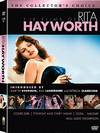





Maureen O'Hara
Biography | Filmography | Articles | Downloads | Links | Image Credits | MIRACLE ON 34TH STREET | HOW GREEN WAS MY VALLEY | THE QUIET MAN
Article 1
Queen of Technicolor flew the coopBy Mitchell SmythThe Toronto Star, April 2, 1995 page C9Maureen O'Hara was no swooning heroine. She gave as good as she got. As British critic Julian Fox recalls: "She dotted Tyrone Power on the head with a rock, outfenced Errol Flynn and Cornel Wilde, clouted John Wayne around the ear . . . and rolled in the sand with Jeff Chandler." Power and Flynn and the rest are gone, but Maureen O'Hara is still with us, dividing her time between her mansion in her native Ireland (she spends the summers there), and her winter home in St. Croix, U.S. Virgin Islands. She has been a widow since 1978, when her third husband, retired U.S. Air Force General Charles Blair, died in a plane crash on the island of St. Thomas. After Blair's death, O'Hara took over his job as president of Antilles Airboats - she was the first woman president of a commercial airline - until her retirement a few years later. That was her second retirement. She had quit the screen when she married Blair in 1968, apart from Big Jake (1971) and the forgettable How Much Do I Love Thee? the same year. Retired she remained until 1991 when she was tempted before the cameras again to play John Candy's domineering mother in Only The Lonely. O'Hara, who will be 75 in August, is best remembered by many filmgoers for her co-starring roles with John Wayne. The public image of them together is so strong that it's difficult to believe they made only five films together. Many people believed they were husband and wife. She admits Wayne was her favorite co-star. "But Duke and I never had romantic feelings for each other," she says. "We were just good buddies, for 35 memorable years." Perhaps her most memorable outing with Wayne was 1951's The Quiet Man, which you must have seen on television a couple of weeks ago (it's always on around St. Patrick's Day). For that movie, director John Ford took the cast on location to the west of Ireland. It was a nostalgic return "home" for O'Hara, who as Maureen FitzSimons, had left the Emerald Isle 13 years earlier to seek fame in England. Charles Laughton chose her for a leading role in Jamaica Inn, in 1938, then took her to Hollywood to play Esmeralda, the gypsy girl, opposite Laughton's Quasimodo in The Hunchback Of Notre Dame in '39. Some less memorable roles followed, then she was signed by John Ford to play the feisty Angaharad Morgan, who falls in love with village pastor Walter Pidgeon, in the Oscar-winning How Green Was My Valley in 1941. But it was the increasing use of color in the mid-'40s that really put her on top and soon the fan magazines were calling her "The Queen of Technicolor." That complexion, those green eyes, that mane of flame-red hair and the costumes - pirate queen, harem beauty, gypsy princess, western pioneer - were made in heaven for Technicolor. Why did she retire? She said in 1974:"They're not writing movies for women any more and it's hard to find anything worth doing." But husband Blair, in an interview about the same time, may have been closer to the truth. Asked how he'd feel about her falling into a hero's arms on screen again, he said: "I'm very conservative and I wouldn't like that." Whatever Happened To . . . appears Sundays in Spotlight. © 1995 Toronto Star Newspapers, Ltd. |
|
Return to the Maureen O'Hara main page. |
| Now in Print! |
|---|
| Now on DVD! |
|---|
Buy Videos & DVDs |
|
Buy Movie Posters |
|
Buy Movie Posters |
|
Classic
Movie Merchandise |
|
![]() Printer-friendly version.
Printer-friendly version.
![]() Return
to the top.
Return
to the top.
Last updated:
March 10, 2011.
Reel Classics is a registered trademark of Reel Classics, L.L.C.
© 1997-2011 Reel Classics, L.L.C. All rights reserved. No
copyright is claimed on non-original or licensed material.
Terms of
Use.









